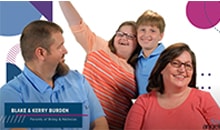A B C D E F G H I J K L M N O P Q R S T U V W X Y Z
See the complete list of topics.
Life Expectancy and Adult Health | Long Term Planning | Low Glycemic Index Treatment (LGIT)
Life Expectancy and Adult Health
Young adults with AS continue to learn and are generally not expected to have deterioration in their mental abilities. Physical health in AS appears to be remarkably good. Although the severity or frequency of seizures may improve with age there is likely to still be the need for some type of anticonvulsant medication. Mobility issues become a more predominant concern as the child with AS ages, often associated with concerns about obesity. Individuals with AS who have severe ataxia may lose their ability to walk if ambulation is not encouraged. Scoliosis can develop in adolescence and is especially a problem in those who are non-ambulatory [36, 49]. Scoliosis is treated with early bracing to prevent progression, and surgical correction or stabilization may be necessary for severe cases.
The main adult problems in those with AS are essentially continuation of problems present in childhood. These include problems of seizure control, difficult behaviors and abnormal physical movements. The movement problems cover areas of ataxia, diminished ambulation and scoliosis. Adults with AS, due to behavioral issues, are perhaps more likely to be given some type of neuroleptic medication, and side effects or sedative effects of these agents can be a health problem. The good news regarding adult health in AS is that many health matters are the same as those encountered in the normal population.
It does not appear that there is any major neurodegeneration event and that the brain per se (as determined by MRI) is able to withstand chronic seizure problems without obvious morphologic changes. There appears to be no apparent increased risk for malignancy or tumor problems and it appears that if longevity is diminished, it is only to a mild extent. Life span does not appear to be dramatically shortened in AS but may be decreased by 10-15 years. There are reports of AS individuals living beyond 70 years although there is as of yet no actuarial data that estimates life span [87, 88]. Hopefully, the results of a current study on natural history, funded by NIH, will provide important information in the near future.
Long Term Planning
Also see S – Special Needs Trust
A special needs trust is a trust designed for beneficiaries who are disabled, either physically or mentally. It is written so the beneficiary can enjoy the use of property that is held in the trust for his or her benefit, while at the same time allowing the beneficiary to receive essential needs-based government benefits. There are administrative advantages of using a trust to hold and manage property intended for the benefit of the beneficiary if the beneficiary lacks the legal capacity to handle his or her own financial affairs.
In the United States, such trusts provide advantages in helping beneficiaries qualify for health care coverage under state Medicaid programs, and also for monthly cash payments under the Supplemental Security Income (SSI) program operated by the Social Security Administration.
Angelman Family Contributions
I cannot stress enough… Plan long term! I waited and then I was hit with a lot of decisions all at once. Plan… Plan… Plan!
Marsha
Long term planning is a necessary evil. It causes great sadness to imagine our angel’s life after we are gone. But we must have a plan.
AS Family Member
Low Glycemic Index Treatment (LGIT)
LGIT is a high-fat, limited-carbohydrate diet proven successful in reducing seizures in AS by up to 90%. Supervision by a physician familiar with the treatment is needed.
See the Resources & Education section and select Diet:Low-Glycemic Index Treatment (LGIT) & Ketogenic from the Categry dropdown menu, for a list of resources.
Angelman Family Contributions
Do not kill yourself following a specific diet unless you see clear evidence in your child that it is beneficial!!
AS Family Member





